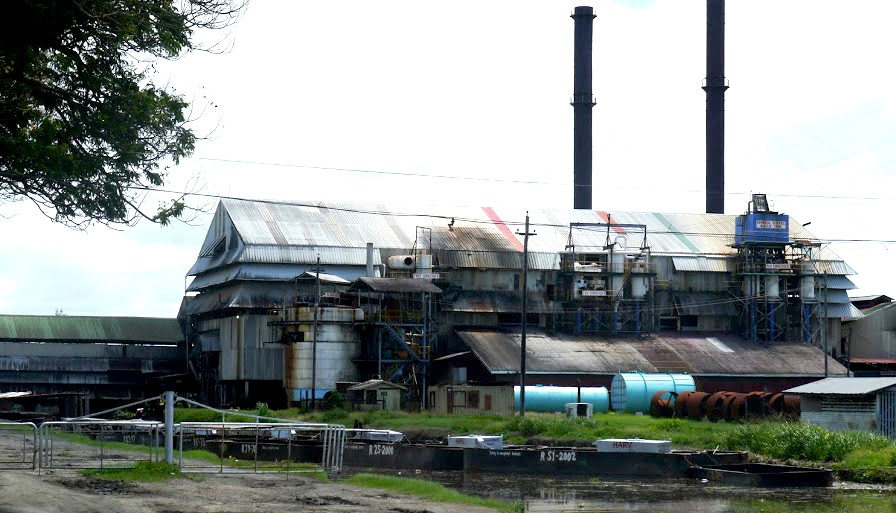
The Rose Hall estate
-front runner is Indian/Ghanaian consortium
June 4 2019
The Special Purpose Unit (SPU) established to facilitate the privatisation of the three sugar estates closed by the APNU+AFC government is hoping to complete its first sale in July even as it says it is battling to access information from the Guyana Sugar Corporation (GuySuCo).
“Of the three estates up for privatisation, Rose Hall has received most of the interest. Out of the three companies interested in Rose Hall, [Pricewater-houseCoopers] is finalising discussions with one of the companies. Discussion are in a delicate state… we are hoping that by the end of July we can have an agreement which we can ask Cabinet to ratify” Head of the SPU Colvin Heath-London told a press conference yesterday.
According to Wilfred Baghaloo, of valuator PricewaterhouseCoopers (PwC), the “front runner” is a joint Indian/Ghanaian consortium which is likely to produce sugar as well as inputs for the cosmetics industry at the estate. The consortium includes persons from India, Ghana and Guyana. The Guyanese include those providing legal services and former management of Rose Hall while Ghanaians are providing logistics and factory knowledge and the Indians technical expertise in sugar and machinery.

It is expected that all the estates privatised will remain in the sugar cane industry as opposed to the sugar industry and Baghaloo stressed that many things can be done with sugar cane.
He said the privatisation itself will be market-driven to ascertain the best commercial prices based on evaluations of business potential and asset value.
Yesterday’s press conference came just days after Director General in the Ministry of the Presidency, Joseph Harmon was unable to shed light on the intended privatization of the three estates when asked by Stabroek News at a press conference.
Baghaloo noted that he had met with Cabinet on March 19th and written it on two other occasions to give an update on the process, including the challenges being faced. “I told them there were three bids which came from a public process where proposals were requested [and that] we were likely to have conclusion to the privatisation of one of the estates by end of July and by the end of November we’ll have a better fix on the two other estates,” he noted, before adding that while the negotiations in relations to Rose Hall had progressed quite nicely nothing is completed as yet.
“We are now sharing a draft with their legal team and we’ll see what their response is,” he added.
Baghaloo clarified that while there are several challenges, the process is “proceeding quite nicely” in his opinion.
One of these challenges relates to access to financial information on the operations of the estates.
Baghaloo noted that challenges with valuation of assets anchors primarily around information that is needed from GuySuCo.
“To date, I have not received that information. I received an audit report but need management accounts for each estate [which would include] age of equipment, the names of the suppliers for major equipment, last maintenance dates…,” he explained.
This particular challenge is having the most impact in relation to the possible sale of the Skeldon estate.
“Because of various nuances in the media, Skeldon is a little challenging right now. It is also one of the bigger priced projects. It requires a lot more investment, a lot more due diligence, a lot more time but we have had interest and continue to have interest but they have not reached the level of negotiations. They are still fairly abstract. One party showed interest last week,” he shared.
The valuators have since 2017 and as recently as May 14th requested of GuySuCo the agreement with the manufacturers of the Skeldon Factory, age and duration of use of the equipment, the electricity co-generation plant’s historical information and agreements with electricity buyers so that “some rough calculations” of the economic value of the equipment can be completed.
Despite these requests and a directive from Cabinet that the information be provided, Heath-London explained that the SPU has only received an “acknowledgment” from GuySuCo. The SPU is, however, willing to continue to engage GuySuCo on a good faith basis.
“I’ve not felt any ill intent. I’m not happy with the flow of information and data but that’s kinda normal for most privatisations,” he said.
There has been tension between the SPU and GuySuCo over a number of issues including control of assets.
Baghaloo noted that Guyana’s privatisation attempt is unique as while three estates have been closed government retains ownership of the other three even as it invites the private sector into the industry.
This unique feature raises questions about the profitability of those estates. “Are these the least profitable estates? Why are you privatising these three and not the others? How do you ensure that they have an environment where private sector can compete with public sector for scarce resources, such as access to markets, access to cane, access to people, access to logistics, such as transportation? Those are the issues we have to resolve,” he stressed.
Other challenges include the political climate and the December 21st no-confidence vote, which according to Heath-London caused “several strong investors who were in play to sit out.”
He explained that these investors were concerned that a purchased asset could be nationalised. The People’s Progressive Party/Civic has publicly stated that it would not honour the sale of any sugar estate if it is re-elected.
“Questions arise about who will sign the agreement if there is no Cabinet in place…Suppose I spent all my resources, pay all my legal fees and end up in the period where general election is called? Am I wasting my money? Am I wasting my time?” Baghaloo added.
Meanwhile the lack of cane supply for the Enmore estate has affected the sale of that property.
In the case of Wales, Heath-London stressed that the diversification team has been able to enter into arrangements with several small, medium and large scale farmers, most of whom are Guyanese in origin, while several of the larger farmers are from farther afield, regionally and internationally.
“Work is ongoing in this field. Predominantly the crop these farmers want to put into production is rice and presently close to over 1,000 acres is under rice cultivation… Farmers who were given leases are now doing land conversion so as to plant their crops,” he explained, before adding that anyone who travels to Wales today will see this taking place.
“Wales is managed by an able agricultural team and a lot of those members are persons who would have worked with GuySuCo and we are providing technical support so the farmers that come into the space would be extended the support. The small farmers in and around the area [will have] technical support,” he said.
He further explained that while agricultural lands surrounding the three estates to be privatised will remain property of people of Guyana, they will be leased to provide for production needs of the factories and surrounding land of approximately 15 to 20 acres will be sold.
